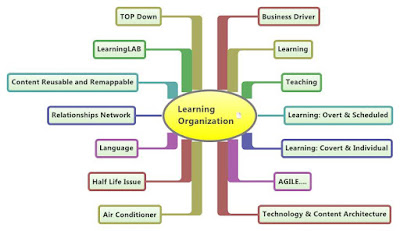Introduction to Learning Organisation
The term learning organisation was first used by Richard Pascal in 1980.But the term Learning organisation was popularized with the publication of Dr Peter Senge that is Fifth Discipline(1990).Dr Peter Senge defines Learning organisation as "oragnisations where people continually expand their capacity to create the results they truly desire , where new and expansive patterns of thinking are nurtured, where collective aspiration is set free , and where people are continually learning to see the whole together".
According to Leitao and Martins(1998) Learning Organisation is the idea that this is in itself a
organisational change concept because “continuous learning” means constant transformation,
because learning means transforming through a continuous process of constructing firm’s
identity through its interactions with the environment.
Figure 1 : Learning Organisation
The dimension that distinguishes learning from more traditional organisations is the mastery of certain basic disciplines or "component technologies". Peter Senge identifies five components in order to converge innovative learning into the organisation.These composed of :
Figure 2: Five disciplines by Peter Senge
- Personal mastery-occurs when an individual has a clear vision of a goal, combined with an accurate perception of reality. The gap between the vision and reality drives the employee to practice all necessary related activities to realize the vision.
- Shared Vision -Every employee should understand the vision of the organisation.
- Mental Models-the employees must identify the values of the company and what the business is all about.
- Team building/learning -It is crucial for the workforce to consider its colleagues as team members instead of rivals. It is the first step to set up dialogues wherein people dare to be vulnerable and express their real personality.
- Systems thinking - Instead of focusing on individual issues, systems thinking reflects the observational process of an entire system. Managers have to understand that every action and consequence is correlated with another.
References
- Argyris, C. and Schon, D.A. (1996) Organizational Learning II: Theory, Method and Practice, Addison-Wesley, London. Argyris, C. and Schon, D.A. (1978). Organizational Learning: A Theory in Action Perspective, Addison-Wesley, London.
- Senge(2006)'The fifth discipline: The art and practice of the learning organization'.New York,NY :Bantam Doubleday Dell Publishing Group, Inc.
- Figure 1 : Learning Organisation : [Online] Available at :https://apessay.com/order/?rid=cc49f4f3231bb03f/[Accessed 8th September 2018].
- Figure 2 : Five Disciplines :[Online] Available at: https://www.toolshero.com/management/five-disciplines-learning-organizations.[Accessed 8th September 2018].



Good job ! Interesting
ReplyDeleteThanks Indika bro
DeleteArticle accepted.
ReplyDeleteThank you Sir
DeleteGood article.
ReplyDeleteThank you
DeleteInformative article
ReplyDelete